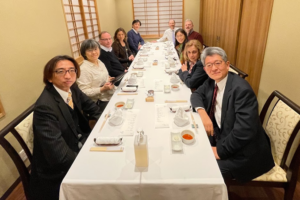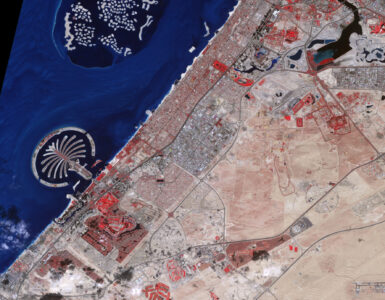More than 30 scientists met for the 18th meeting of the Joint CEOS-CGMS Working Group on Climate (WGClimate-18) on 28 February– to 2 March 2023 in Tokyo . JAXA hosted the hybrid meeting, and treated participants to keynote science presentations during the 3-day event.
The primary objectives of WGClimate-18 included 1) prioritize items for the 2023 Work Plan and draft schedules and deliverables, 2) identify individuals to lead activities or liaise with other gorups, and 3) bring members up-to-date on activities affecting the Working Group. WGClimate-18 was the first meeting led by new Chair Jeff Privette (NOAA) and Vice-Chair Wenying Su (NASA).
A primary role of WGClimate (i.e., the Group) is to assess and coordinate space agency capabilities to improve the systematic availability of Climate Data Records of the Essential Climate Variables (ECVs) as determined by the Global Climate Observing System (GCOS). As GCOS recently provided an update to its needs (i.e., “Actions”) via its 2022 Implementation Plan (GCOS IP), WGClimate-18 participants focused on developing a new IP response approach. This year, the Group will work hand-in-hand with the GCOS Secretariats and Panels to ensure better understanding of the needs and determine the most helpful response. Specifically, WGClimate and GCOS collaboratively formed small teams to address the respective Actions. The official WGClimate response therefore will be a set of team reports, one per Action, developed between 2023-2024.

Giving his presentation by WGClimate Chair, Jeff A. Privette
Also during WGClimate-18, the Group discussed a restructuring of its unique Essential Climate Variable (ECV) Inventory. The Inventory contains metadata about Climate Data Records (CDRs), i.e., long-term homogenized time series data sets from satellites. Although the Group relies on this tool to link space agency capabilities with GCOS needs, its updates and upkeep have been challenging. Through the restructuring, the Group will simplify the architecture and associated processes. Therefore, in 2023, the Group will add a final 45 CDR records to the existing Inventory while simultaneously developing a simplified structure for a 2024 release.
WGClimate-18 also included updates on the CDR Use Case and CDR Taxonomy initiatives. The Group has published 15 Use Cases online, and agreed at the meeting to focus now on wider communication of this collection. The Group will continue to accept new Use Case submissions, however. The Group discussed next steps on a CDR definitions framework, leveraging feedback from a poster at the 2023 American Meteorological Society Annual Meeting. The Group is planning a manuscript available for review later in the year. As per prior years, the Group will develop the 2023 Space Agencies Statement to the Subsidiary Body for Scientific and Technological Advice (SBSTA), part of the United Nations Framework Convention on Climate Change, to be delivered at the 28th Conference of the Parties in November 2023.
Finally, WGClimate-18 featured an update from the Greenhouse Gas (GHG) Task Team (TT) by new TT lead Yasjka Meijer. The TT met in February where it reviewed the GHG Roadmap, focusing particularly on defining metrics and milestones for its activities. In 2023, the TT is reviewing the space observatories needed to better measure both natural and anthropogenic methane and CO2 in the atmosphere. This challenge is complicated by the highly variable biogenic background signal for more abundant CO2, and a comparatively low source signal from methane. Different observatories are tailored to different GHG sources (e.g., cities, smokestack plumes, agricultural emissions). The TT also considered field observation needs to support Monitoring & Verification Support (MVS) capabilities. Finally, the TT will continue to work with the Agriculture, Forestry and Other Land Uses team to align their respective methods.
One challenge the Group endures is having wider agency participation. Currently, there are not enough engaged agencies for the Group to address the many requests within CEOS and from external organizations (e.g., GEO). The Group encourages all CEOS agencies to identify representatives so that it can better partner and contribute to the activities. The Group will next meet in Frascati just before the October Technical Workshop of the CEOS Strategic Implementation Team.

Onsite participants in the WGClimate-18 enjoying an ice-breaker dinner. Approximately 30 people participated overall, about half of which were virtual participants.
Jeff A. Privette(NOAA), Joint Working Group Climate Chair






